Italy / 5 min read
Have you ever put koji on a wild plum?
Hai MAI messo del koji sulle prugne selvatiche?
Investigating a kitchen in the hills of Bologna to learn how chefs awaken forgotten biodiversity
Biodiversity reawakening can happen in our backyard, among vineyard rows, under the ancient trees that surround a farm, along the river that envelops a valley, or in the meadow where children play.
When thinking about biodiversity, our minds, lost and misguided by capitalism, imagines indigenous cultures as exotic, which often encourages conflicts and unsustainability.
To witness the diversity around us, sometimes all a person needs to do is look away from the distractions of technology and see the magnificence of a tree and its fruit. Upon seeing the varying colors illuminated in sunlight, surrounded by the buzz of bees, the ecosystem becomes more than the sum of its parts.
This is the story of a chef and a place, the story of a community where each player is a part of a larger, connected ecosystem.
Alessandro Atzori is an atypical chef. As you can watch him moving between the stoves and the steel of his kitchen, you are witnessing a chef of the future: curious, resilient, and regenerative.
He is what every cook should be.
Cooking is not just about putting dishes on the table.
“When I started cooking I was overwhelmed by an insatiable curiosity. I felt a jolt, like an electric shock, every time I read about an unknown ingredient, every time I saw a new technique or every time I tasted something new. During university, I started visiting a farmer[s'] market [the Earth’s Market of Bologna, founded by Riccardo Astolfi] and I understood that biodiversity was not to be found far away, but that it was everywhere around us.”
- Alessandro, chef of La Roverella
Curiosity is the humus of culture. The rich soil that fertilizes ideas. Cooking, in the true etymology of the word, is culture; it is cultivating and caring for biodiversity and enhancing it through art. Because of this, “La Roverella,” Alessandro’s farmhouse, is more than a restaurant; it is a house of culture. Within the walls of this building, situated on the slopes of the hills of Bologna, the calanchi, the cuisine of the future, rises.
“The sour smell of the vats boiling with must goes to cheer the souls,” (l’aspro odor dei tini che ribollono di mosto va a rallegrare le anime) said the Italian poet Giosuè Carducci, who taught nearby, in the oldest university in the world. He couldn’t be more right. The smell of fermentation in La Roverella stimulates the mind and cheers the soul.
This territory is dusty and harsh, much like the biodynamic and slightly oxidized wines that are produced here. It is curious to think of the symbolic nature of the territory’s structure: La Roverella is housed within the vineyards of the Maria Bortolotti farm, one of the first to practice organic and biodynamic agriculture in Italy. The vineyards of Pignoletto (as we call the Grechetto Gentile here) cross with those of Sauvignon and Barbera. It is a maze of colors, scents, and sounds. It is viticulture as it should be done. All around are wild herbs and fruits, such as nettles; wild garlic (Allium vineale) from the vineyards; oaks and downy oaks (Quercus pubescens) from whose acorns Alessandro will produce breads and biscuits; and rusticani, or wild plums (Prunus cerasifera).
“The Italian agricultural landscape is not as pristine as an equatorial forest or a South American mountain, but many resilient plants have been able to adapt, they have survived our indelicate passage. When one of these ingredients is used in a dish, respect for life is revived...”
- Alessandro, chef of La Roverella
A chef who preaches respect for the Earth and those who live on it, Alessandro rewrites the very nature of cooking.
Rusticani, or wild plums, are also protagonists of this rebirth story. They have been rediscovered and reawakened.
Reawakening these traditions is not fashion, it is duty. It is both an ingredient and symbol of a renaissance. Honoring this duty to traditional culture, rusticani makes local Japanese umeboshi to be used in savory dishes or desserts. It is made by infusing the rusticani in strictly local alcohol and grappa, an Italian brandy, to create a richness. They are then fermented again to become a wine and then a vinegar, resulting in a brilliant sweet and sour nectar that almost tastes of the sea.
As a co-protagonist of this story, I relive some images of my childhood clearly, as Proust in front of his madeleine. The rusticano is a wild plum that traditionally flourished here in the Po valley at the edges of agricultural lands, in the gardens of public houses, and the floodplains of rivers.
The Reno river flows just a few kilometers from here. As a child, I used to steal those small, round fruits from the neighbors’ trees, both in early spring when they are green, hard, crunchy, and wonderfully acidic, and in early summer when they turn red, puffy, and juicy, forcing you to compete with the birds to enjoy the bittersweet bonbon. The acidity remains at every stage, as in life.
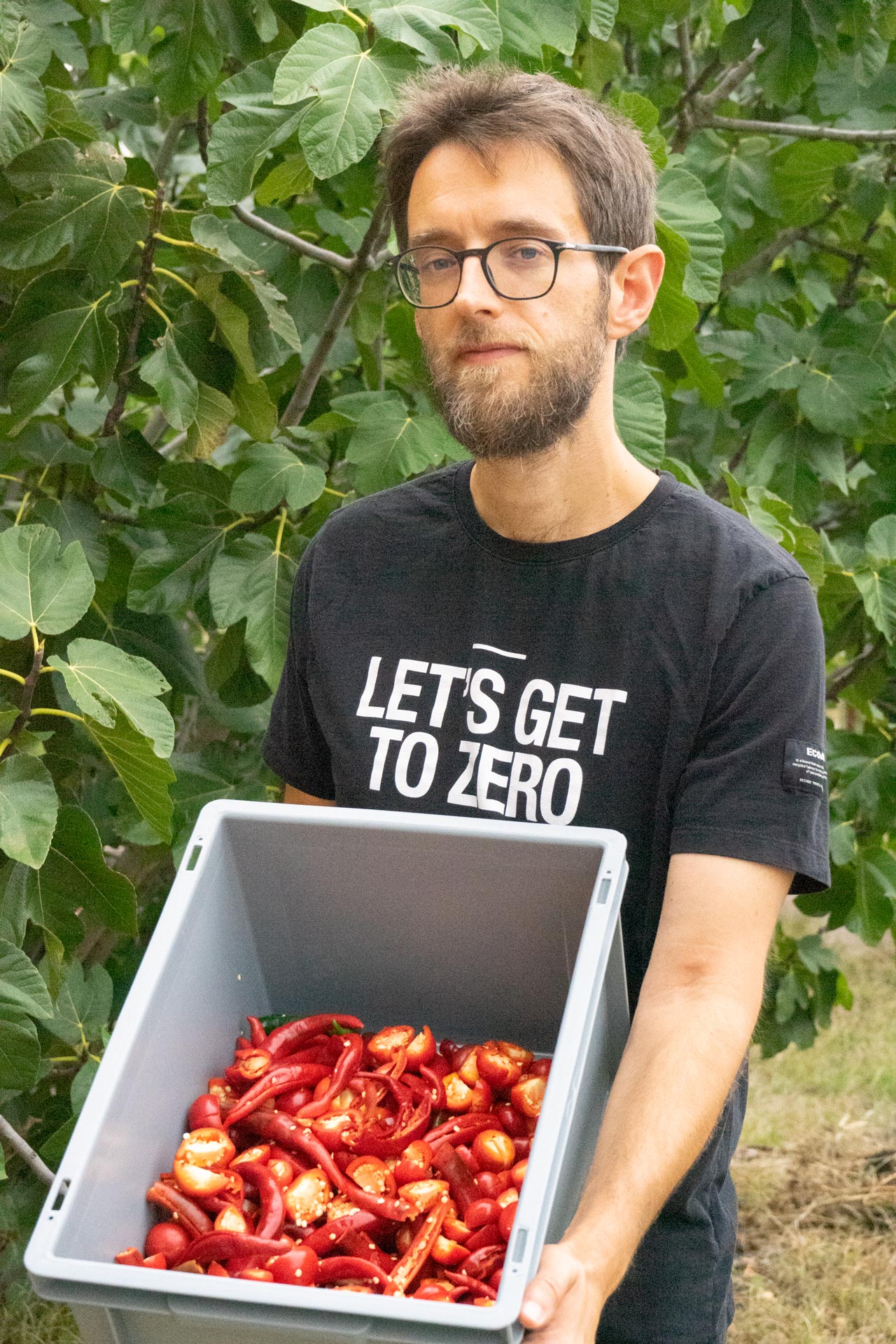
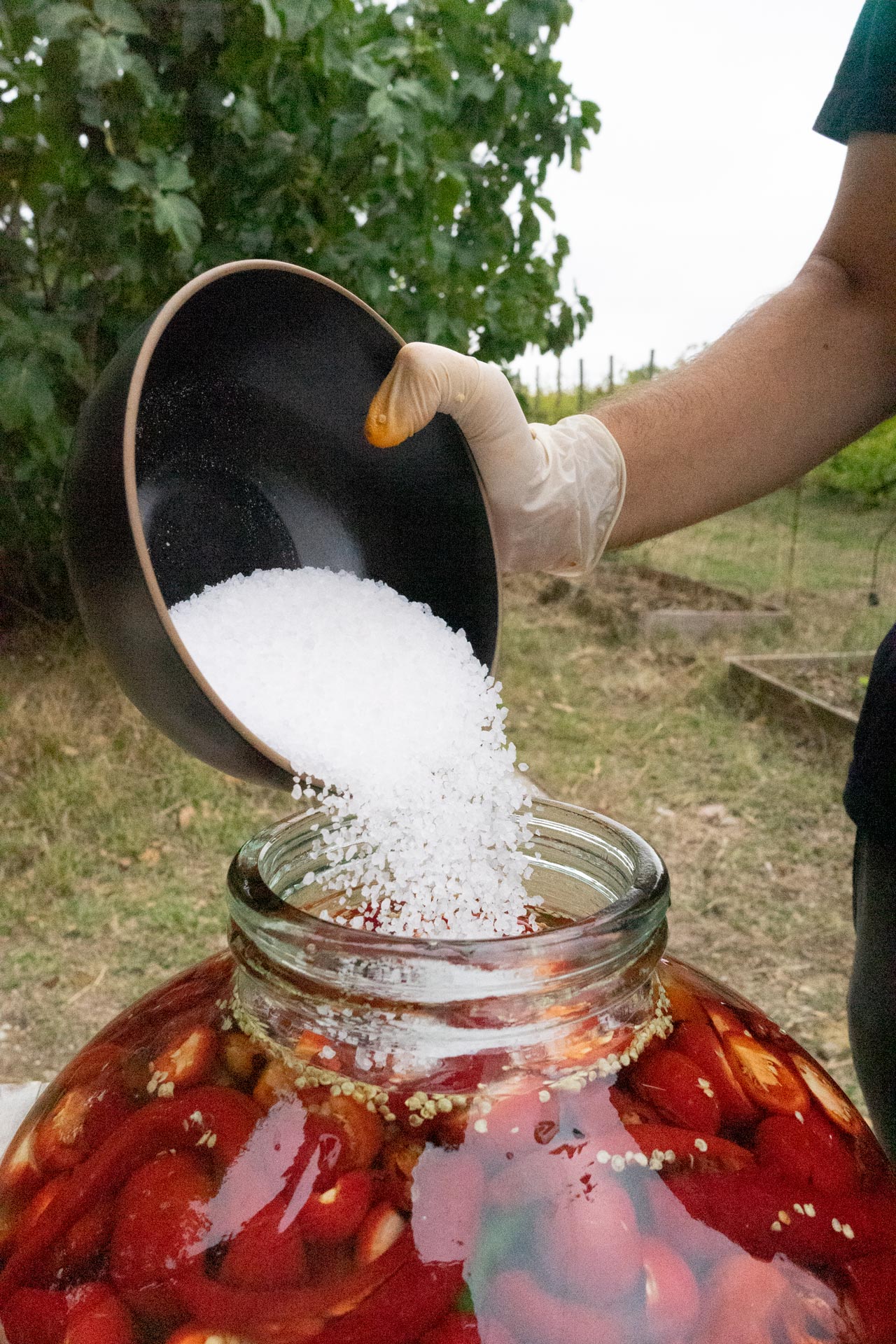
This is one of the reasons why it has been abandoned and dismissed as an invasive species. In the days of my youth, my grandmother, Alfonsina, was there with me, capable of evaluating the limited number of rusticani to eat with greediness before the stomach would ache.
While the rusticani ferment and macerate in the Atzori’s kitchen, they are in excellent company. Olives – also local (until a few decades ago the Bolognese hills were covered with olive trees that now are only a scattered presence) are lacto-ferment to become table olives; chili peppers boil waiting to become a spicy sauce; and seeds and dried fruit pass under the magic wand of other fungi and bacteria become miso and fermentini (vegan cheeses).
It’s all here, in just over 10 square meters of stainless steel.
These ten square meters are an Amazonian forest of a kitchen. I repeat to myself Alessandro’s words:
“Putting these ingredients into a menu is not an easy task, when you find yourself in the morning humidity digging for wild garlic or when you spend hours in the undergrowth picking nettles you think of all the other cooks, in other restaurants, who at that same moment are probably opening plastic bags in the heat of their kitchens, full of ready and clean cultivated herbs. But despite the difficulties I do not see another way, I would never go back to those soulless menus, as comfortable as boring and as sterile.”
- Alessandro, chef of La Roverella
According to Alessandro that is how it is. Being a regenerative cook, as well as being the spokesperson for a community of people who share the same values, is like crossing the Pillars of Hercules towards the ocean.
And while the badlands of the Bolognese hills screech and dance slowly, their clay soils erode down, causing instability. I see a powerful analogy in this, everything moves, flows, and eventually degrades. You remain standing.
And how can you confront a world that changes with the pace of crisis? You can with culture.
While La Roverella’s kitchen becomes an experimentation laboratory on infusions and fermentations, from the most classic (oh, the wine!) to the most unusual (have you ever put koji on a wild plum?). It also acts as the cradle of a secret retreat. Alessandro likes to see it as a Carbonari’s circle [Carbonari (literally translated as “charcoal makers”) was an informal network of secret revolutionary societies active in Italy], but I like to think about it as the court of a Renaissance prince. In the evenings when the farmhouse is closed to the public, friends, food-lovers and modern alchemists gather around the fermentation vessels. They philosophize about the future while walking and dining among the vineyards, and then experiment together. Socrates would be proud.
That is when the magic happens. What can happen when a large number of different microorganisms, such as yeasts, bacteria, and molds act together on a common substrate?
Everything changes and everything acquires value. This is perhaps the true philosopher’s stone.
Inside and outside La Roverella, wild biodiversity is rediscovered. We experiment on how to enhance it, we discuss how to offer it to the customer, and we discuss the role of the restaurant of the future.
We are active protagonists of a cultural and agricultural change. We are changemakers. Everyone brings to the table an idea of life, of a regenerative world just as in agricultural biodiversity, the ecosystem is more than the sum of its parts. Even amongst people, every idea becomes an ingredient in a much tastier soup.
Is this an awakening? Yes, it is.
Growing biodiversity creates new opportunities for local communities. Farmers find new markets. Entrepreneurs create new food products. Consumers feel more connected. And local economies thrive all across the value chain.
A chef is a trained professional cook and tradesman who is proficient in all aspects of food preparation, often focusing on a particular cuisine.
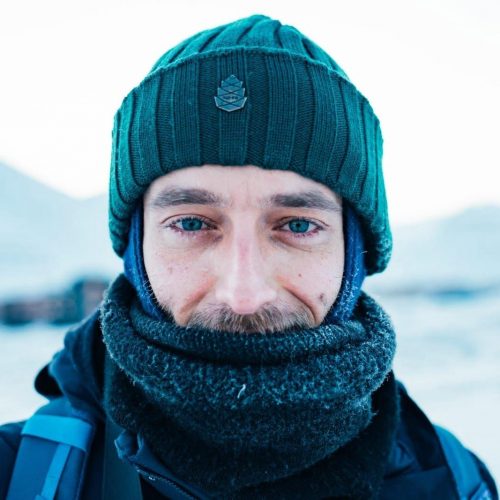
Writer
About
Lexicon of Food is produced by The Lexicon, an international NGO that brings together food companies, government agencies, financial institutions, scientists, entrepreneurs, and food producers from across the globe to tackle some of the most complex challenges facing our food systems.
Team
The Agrobiodiversity Channel was developed by an invitation-only food systems solutions activator created by The Lexicon with support from Food at Google. The activator model fosters unprecedented collaborations between leading food service companies, environmental NGOs, government agencies, and technical experts from across the globe.
This website was built by The Lexicon™, a 501(c)(3) tax-exempt nonprofit organization headquartered in Petaluma, CA.
Check out our Privacy Policy, Cookie Policy, and Terms of Use.
© 2024 – Lexicon of Food™
We have no idea who grows our food, what farming practices they use, the communities they support, or what processing it undergoes before reaching our plates.
As a result, we have no ability to make food purchases that align with our values as individuals, or our missions as companies.
To change that, we’ve asked experts to demystify the complexity of food purchasing so that you can better informed decisions about what you buy.
The Lexicon of Food’s community of experts share their insights and experiences on the complex journey food takes to reach our plates. Their work underscores the need for greater transparency and better informed decision-making in shaping a healthier and more sustainable food system for all.
Professionals at universities and research institutions seeking scholarly articles, data, and resources.
Tools to align investment and grant making strategies with advances in agriculture, food production, and emerging markets.
Professionals seeking information on ingredient sourcing, menu planning, sustainability, and industry trends.
Chefs and food industry professionals seeking inspiration on ingredients and sustainable trends to enhance their work.
Individuals interested in food products, recipes, nutrition, and health-related information for personal or family use.
Individuals producing food, fiber, feed, and other agricultural products that support both local and global food systems.
This online platform is years in the making, featuring the contributions of 1000+ companies and NGOs across a dzen domain areas. To introduce you to their work, we’ve assembled personalized experiences with insights from our community of international experts.
Businesses engaged in food production, processing, and distribution that seek insight from domain experts
Those offering specialized resources and support and guidance in agriculture, food production, and nutrition.
Individuals who engage and educate audience on themes related to agriculture, food production, and nutrition.
Nutritional information for professionals offering informed dietary choices that help others reach their health objectives
Those advocating for greater awareness and stronger action to address climate impacts on agriculture and food security.
Professionals seeking curriculum materials, lesson plans, and learning tools related to food and agriculture.
Over half the world’s agricultural production comes from only three crops. Can we bring greater diversity to our plates?
In the US, four companies control nearly 85% of the beef we consume. Can we develop more regionally-based markets?
How can we develop alternatives to single-use plastics that are more sustainable and environmentally friendly?
Could changing the way we grow our food provide benefits for people and the planet, and even respond to climate change?
Can we meet the growing global demand for protein while reducing our reliance on traditional animal agriculture?
It’s not only important what we eat but what our food comes in. Can we develop tools that identify toxic materials used in food packaging?
Explore The Lexicon’s collection of immersive storytelling experiences featuring insights from our community of international experts.
The Great Protein Shift
Our experts use an engaging interactive approach to break down the technologies used to create these novel proteins.
Ten Principles for Regenerative Agriculture
What is regenerative agriculture? We’ve developed a framework to explain the principles, practices, ecological benefits and language of regenerative agriculture, then connected them to the UN’s Sustainable Development Goals.
Food-related chronic diseases are the biggest burden on healthcare systems. What would happen if we treated food as medicine?
How can we responsibly manage our ocean fisheries so there’s enough seafood for everyone now and for generations to come?
Mobilizing agronomists, farmers, NGOs, chefs, and food companies in defense of biodiversity in nature, agriculture, and on our plates.
Can governments develop guidelines that shift consumer diets, promote balanced nutrition and reduce the risk of chronic disease?
Will sustainably raising shellfish, finfish, shrimp and algae meet the growing demand for seafood while reducing pressure on wild fisheries?
How can a universal visual language to describe our food systems bridge cultural barriers and increase consumer literacy?
What if making the right food choices could be an effective tool for addressing a range of global challenges?
Let’s start with climate change. While it presents our planet with existential challenges, biodiversity loss, desertification, and water scarcity should be of equal concern—they’re all connected.
Instead of seeking singular solutions, we must develop a holistic approach, one that channel our collective energies and achieve positive impacts where they matter most.
To maximize our collective impact, EBF can help consumers focus on six equally important ecological benefits: air, water, soil, biodiversity, equity, and carbon.
We’ve gathered domain experts from over 1,000 companies and organizations working at the intersection of food, agriculture, conservation, and climate change.
The Lexicon™ is a California-based nonprofit founded in 2009 with a focus on positive solutions for a more sustainable planet.
For the past five years, it has developed an “activator for good ideas” with support from Food at Google. This model gathers domain experts from over 1,000 companies and organizations working at the intersection of food, agriculture, conservation, and climate change.
Together, the community has reached consensus on strategies that respond to challenges across multiple domain areas, including biodiversity, regenerative agriculture, food packaging, aquaculture, and the missing middle in supply chains for meat.
Lexicon of Food is the first public release of that work.
Over half the world’s agricultural production comes from only three crops. Can we bring greater diversity to our plates?
In the US, four companies control nearly 85% of the beef we consume. Can we develop more regionally-based markets?
How can we develop alternatives to single-use plastics that are more sustainable and environmentally friendly?
Could changing the way we grow our food provide benefits for people and the planet, and even respond to climate change?
Can we meet the growing global demand for protein while reducing our reliance on traditional animal agriculture?
It’s not only important what we eat but what our food comes in. Can we develop tools that identify toxic materials used in food packaging?
Explore The Lexicon’s collection of immersive storytelling experiences featuring insights from our community of international experts.
The Great Protein Shift
Our experts use an engaging interactive approach to break down the technologies used to create these novel proteins.
Ten Principles for Regenerative Agriculture
What is regenerative agriculture? We’ve developed a framework to explain the principles, practices, ecological benefits and language of regenerative agriculture, then connected them to the UN’s Sustainable Development Goals.
Food-related chronic diseases are the biggest burden on healthcare systems. What would happen if we treated food as medicine?
How can we responsibly manage our ocean fisheries so there’s enough seafood for everyone now and for generations to come?
Mobilizing agronomists, farmers, NGOs, chefs, and food companies in defense of biodiversity in nature, agriculture, and on our plates.
Can governments develop guidelines that shift consumer diets, promote balanced nutrition and reduce the risk of chronic disease?
Will sustainably raising shellfish, finfish, shrimp and algae meet the growing demand for seafood while reducing pressure on wild fisheries?
How can a universal visual language to describe our food systems bridge cultural barriers and increase consumer literacy?
This game was designed to raise awareness about the impacts our food choices have on our own health, but also the environment, climate change and the cultures in which we live.
First, you can choose one of the four global regions and pick a character that you want to play.
Each region has distinct cultural, economic, historical, and agricultural capacities to feed itself, and each character faces different challenges, such as varied access to food, higher or lower family income, and food literacy.
As you take your character through their day, select the choices you think they might make given their situation.
At the end of the day you will get a report on the impact of your food choices on five areas: health, healthcare, climate, environment and culture. Take some time to read through them. Now go back and try again. Can you make improvements in all five areas? Did one area score higher, but another score lower?
FOOD CHOICES FOR A HEALTHY PLANET will help you better understand how all these regions and characters’ particularities can influence our food choices, and how our food choices can impact our personal health, national healthcare, environment, climate, and culture. Let’s Play!
The FOOD CHOICES FOR A HEALTHY PLANET game allows users to experience the dramatic connections between food and climate in a unique and engaging way. The venue and the game set-up provides attendees with a fun experience, with a potential to add a new layer of storytelling about this topic.
Starting the game: the pilot version of the game features four country/regions: Each reflects a different way people (and the national dietary guidelines) look at diets: Nordic Countries (sustainability), Brazil (local and whole foods instead of ultra-processed foods); Canada (plant-forward), and Indonesia (developing countries).
Personalizing the game: players begin by choosing a country and then a character who they help in making food choices over the course of one day. Later versions may allow for creating custom avatars.
Making tough food choices: This interactive game for all ages shows how the food choices we make impact our health and the environment, and even contribute to climate change.
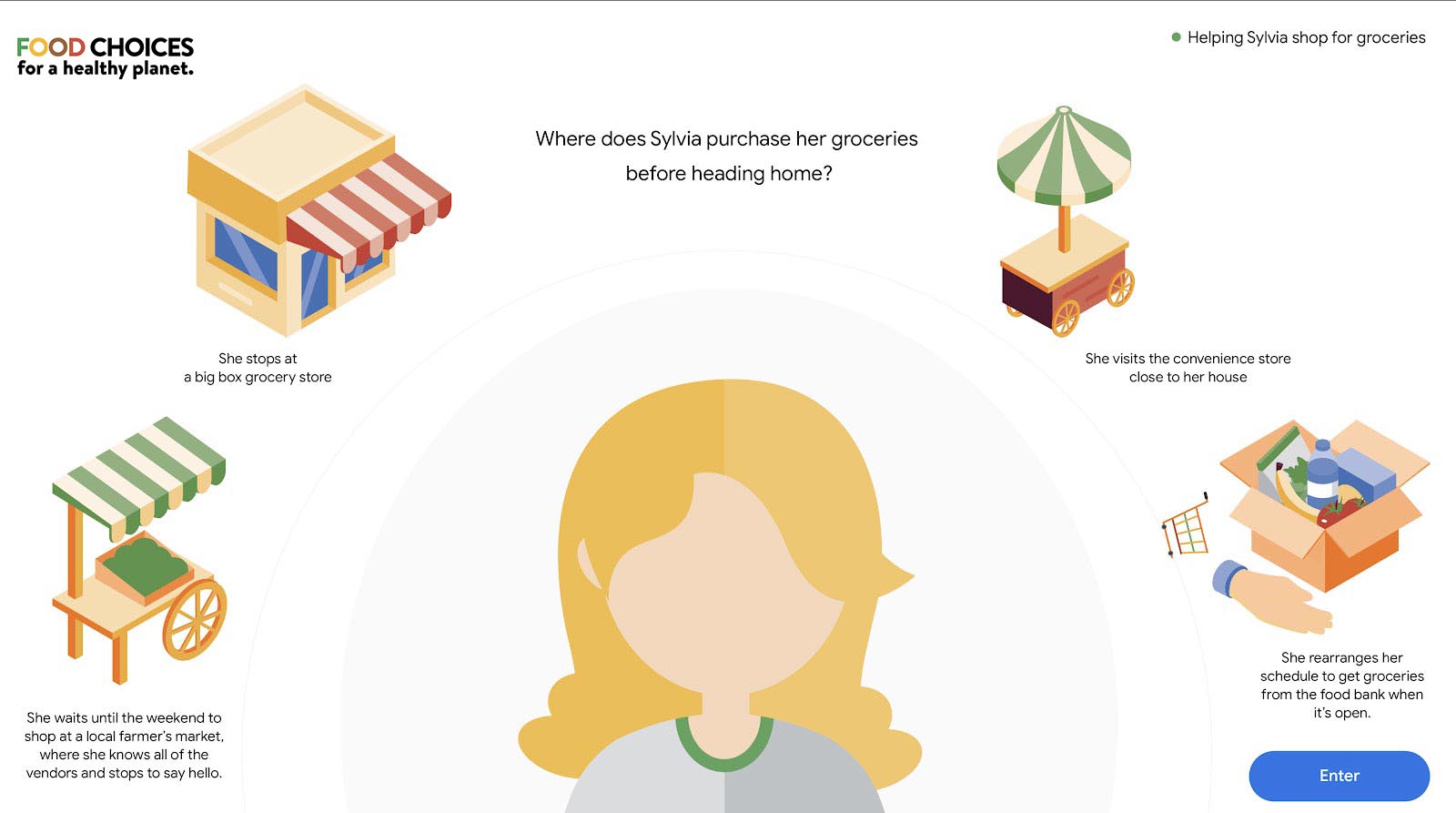
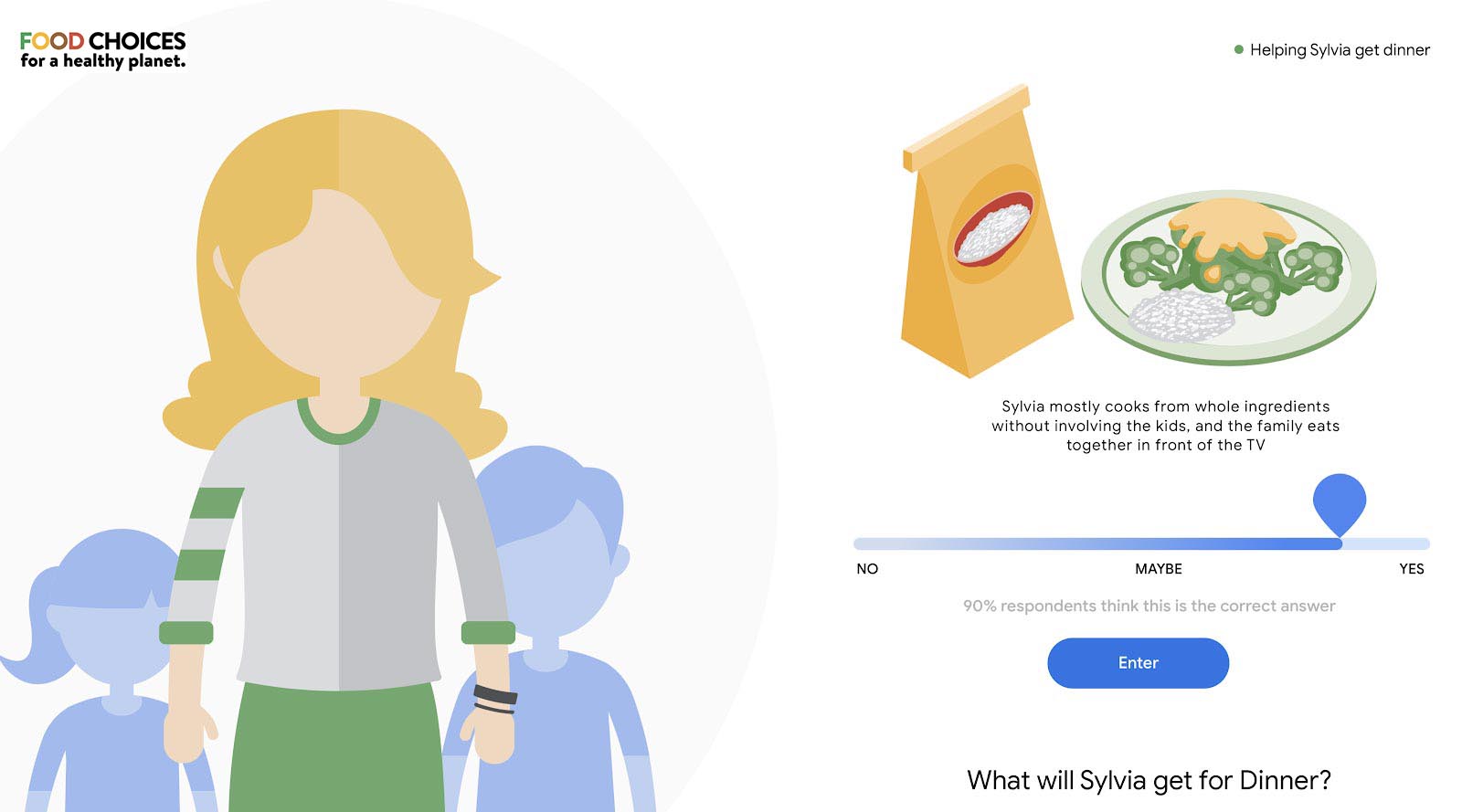
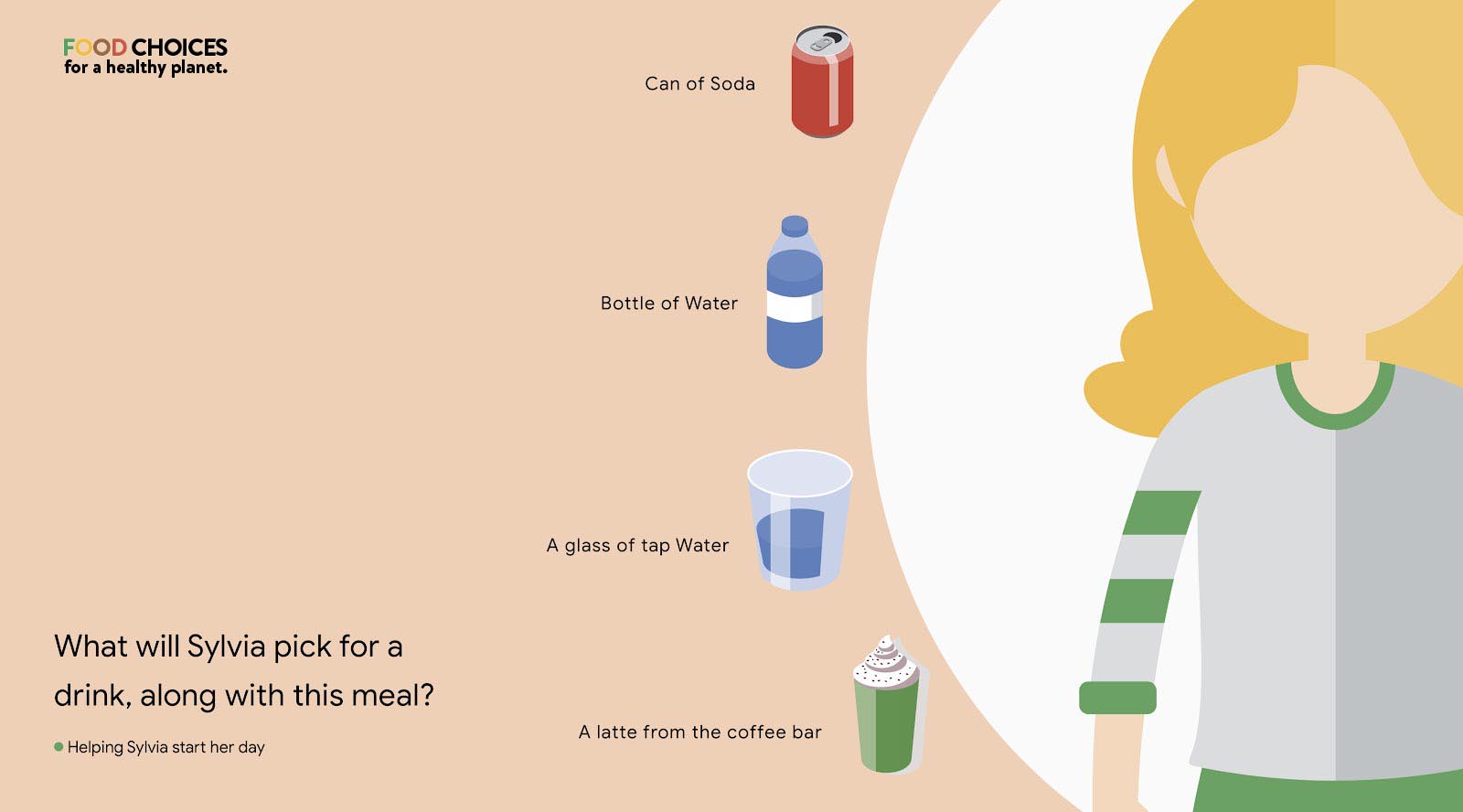
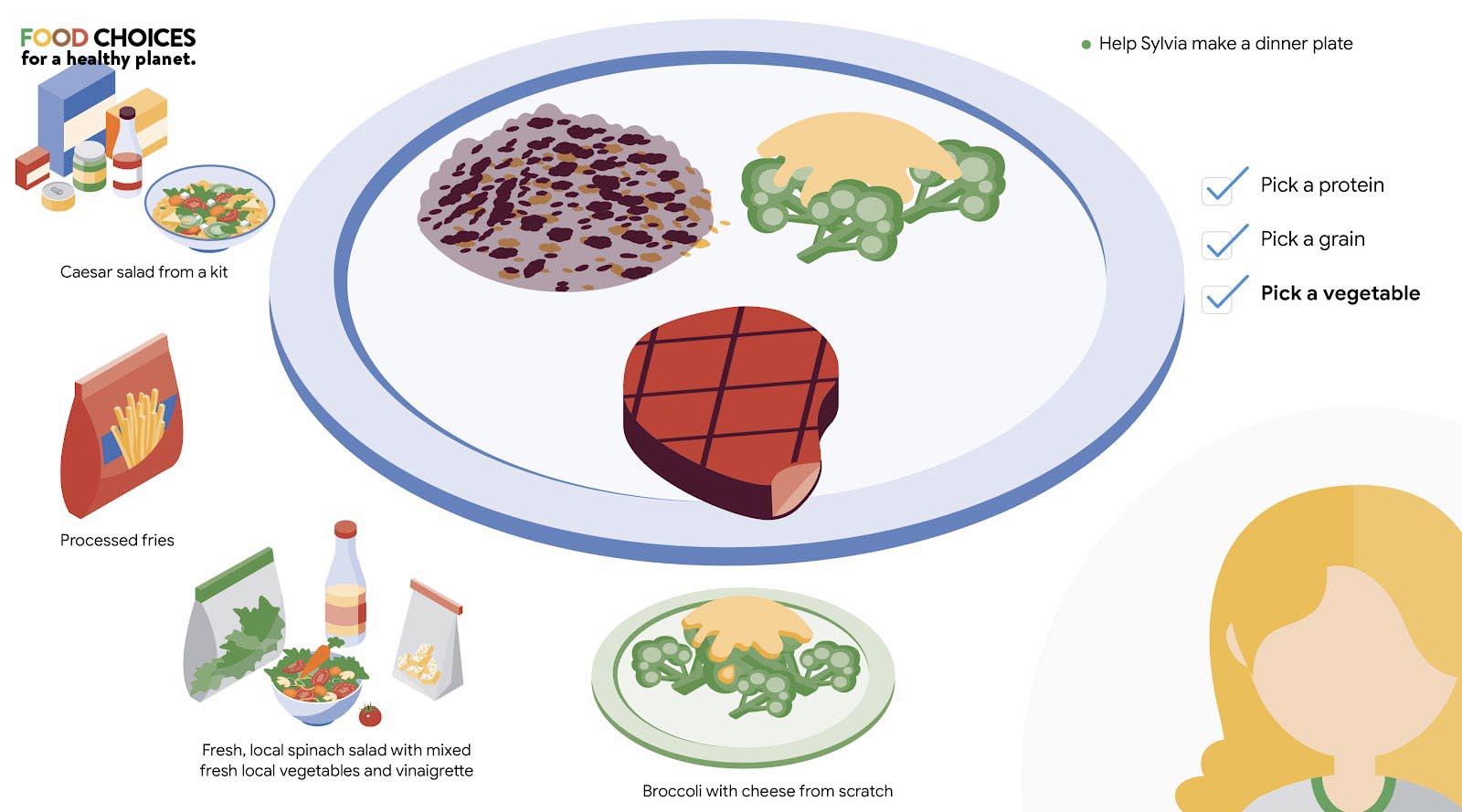
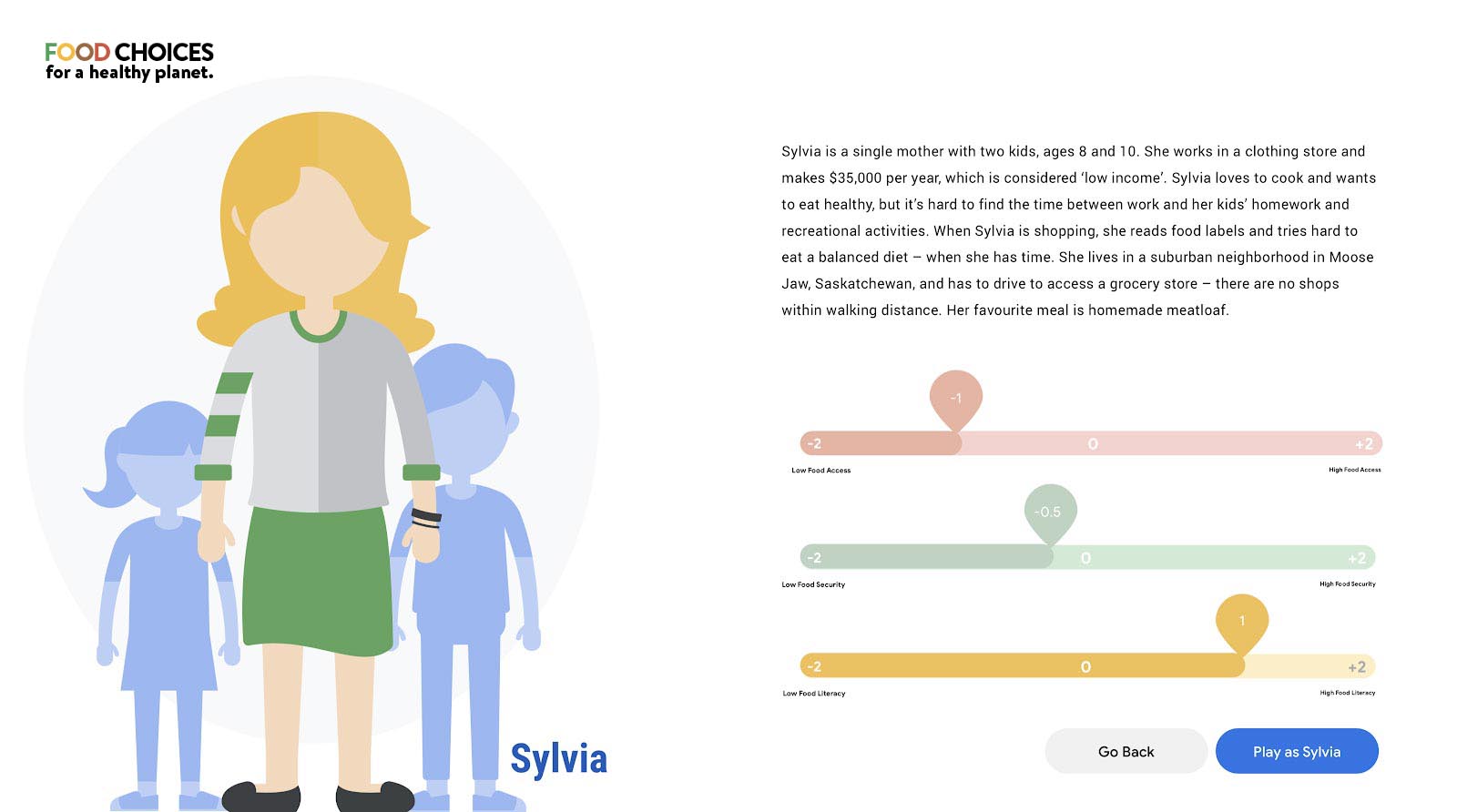
What we eat matters: at the end of each game, players learn that every decision they make impacts not only their health, but a national healthcare system, the environment, climate and even culture.
We’d love to know more about you and why you think you will be a great fit for this position! Shoot us an email introducing you and we’ll get back to you as soon as possible!
Providing best water quality conditions to ensure optimal living condition for growth, breeding and other physiological needs
Water quality is sourced from natural seawater with dependency on the tidal system. Water is treated to adjust pH and alkalinity before stocking.
Producers that own and manages the farm operating under small-scale farming model with limited input, investment which leads to low to medium production yield
All 1,149 of our farmers in both regencies are smallholder farmers who operate with low stocking density, traditional ponds, and no use of any other intensification technology.
Safe working conditions — cleanliness, lighting, equipment, paid overtime, hazard safety, etc. — happen when businesses conduct workplace safety audits and invest in the wellbeing of their employees
Company ensure implementation of safe working conditions by applying representative of workers to health and safety and conduct regular health and safety training. The practices are proven by ASIC standards’ implementation
Implementation of farming operations, management and trading that impact positively to community wellbeing and sustainable better way of living
The company works with local stakeholders and local governments to create support for farmers and the farming community in increasing resilience. Our farming community is empowered by local stakeholders continuously to maintain a long generation of farmers.
Freezing seafood rapidly when it is at peak freshness to ensure a higher quality and longer lasting product
Our harvests are immediately frozen with ice flakes in layers in cool boxes. Boxes are equipped with paper records and coding for traceability. We ensure that our harvests are processed with the utmost care at <-18 degrees Celsius.
Sourcing plant based ingredients, like soy, from producers that do not destroy forests to increase their growing area and produce fish feed ingredients
With adjacent locations to mangroves and coastal areas, our farmers and company are committed to no deforestation at any scale. Mangrove rehabilitation and replantation are conducted every year in collaboration with local authorities. Our farms are not established in protected habitats and have not resulted from deforestation activity since the beginning of our establishment.
Implement only natural feeds grown in water for aquatic animal’s feed without use of commercial feed
Our black tiger shrimps are not fed using commercial feed. The system is zero input and depends fully on natural feed grown in the pond. Our farmers use organic fertilizer and probiotics to enhance the water quality.
Enhance biodiversity through integration of nature conservation and food production without negative impact to surrounding ecosysytem
As our practices are natural, organic, and zero input, farms coexist with surrounding biodiversity which increases the volume of polyculture and mangrove coverage area. Farmers’ groups, along with the company, conduct regular benthic assessments, river cleaning, and mangrove planting.
THE TERM “MOONSHOT” IS OFTEN USED TO DESCRIBE an initiative that goes beyond the confines of the present by transforming our greatest aspirations into reality, but the story of a moonshot isn’t that of a single rocket. In fact, the Apollo program that put Neil Armstrong on the moon was actually preceded by the Gemini program, which in a two-year span rapidly put ten rockets into space. This “accelerated” process — with a new mission nearly every 2-3 months — allowed NASA to rapidly iterate, validate their findings and learn from their mistakes. Telemetry. Propulsion. Re-entry. Each mission helped NASA build and test a new piece of the puzzle.
The program also had its fair share of creative challenges, especially at the outset, as the urgency of the task at hand required that the roadmap for getting to the moon be written in parallel with the rapid pace of Gemini missions. Through it all, the NASA teams never lost sight of their ultimate goal, and the teams finally aligned on their shared responsibilities. Within three years of Gemini’s conclusion, a man did walk on the moon.
FACT is a food systems solutions activator that assesses the current food landscape, engages with key influencers, identifies trends, surveys innovative work and creates greater visibility for ideas and practices with the potential to shift key food and agricultural paradigms.
Each activator focuses on a single moonshot; instead of producing white papers, policy briefs or peer-reviewed articles, these teams design and implement blueprints for action. At the end of each activator, their work is released to the public and open-sourced.
As with any rapid iteration process, many of our activators re-assess their initial plans and pivot to address new challenges along the way. Still, one thing has remained constant: their conviction that by working together and pooling their knowledge and resources, they can create a multiplier effect to more rapidly activate change.
Co-Founder
THE LEXICON
Vice President
Global Workplace Programs
GOOGLE
Who can enter and how selections are made.
A Greener Blue is a global call to action that is open to individuals and teams from all over the world. Below is a non-exhaustive list of subjects the initiative targets.
To apply, prospective participants will need to fill out the form on the website, by filling out each part of it. Applications left incomplete or containing information that is not complete enough will receive a low score and have less chance of being admitted to the storytelling lab.
Nonprofit organizations, communities of fishers and fish farmers and companies that are seeking a closer partnership or special support can also apply by contacting hello@thelexicon.org and interacting with the members of our team.
Special attention will be given to the section of the form regarding the stories that the applicants want to tell and the reasons for participating. All proposals for stories regarding small-scale or artisanal fishers or aquaculturists, communities of artisanal fishers or aquaculturists, and workers in different steps of the seafood value chain will be considered.
Stories should show the important role that these figures play in building a more sustainable seafood system. To help with this narrative, the initiative has identified 10 principles that define a more sustainable seafood system. These can be viewed on the initiative’s website and they state:
Seafood is sustainable when:
Proposed stories should show one or more of these principles in practice.
Applications are open from the 28th of June to the 15th of August 2022. There will be 50 selected applicants who will be granted access to The Lexicon’s Total Storytelling Lab. These 50 applicants will be asked to accept and sign a learning agreement and acceptance of participation document with which they agree to respect The Lexicon’s code of conduct.
The first part of the lab will take place online between August the 22nd and August the 26th and focus on training participants on the foundation of storytelling, supporting them to create a production plan, and aligning all of them around a shared vision.
Based on their motivation, quality of the story, geography, and participation in the online Lab, a selected group of participants will be gifted a GoPro camera offered to the program by GoPro For A Change. Participants who are selected to receive the GoPro camera will need to sign an acceptance and usage agreement.
The second part of the Storytelling Lab will consist of a production period in which each participant will be supported in the production of their own story. This period goes from August 26th to October 13th. Each participant will have the opportunity to access special mentorship from an international network of storytellers and seafood experts who will help them build their story. The Lexicon also provides editors, animators, and graphic designers to support participants with more technical skills.
The final deadline to submit the stories is the 14th of October. Participants will be able to both submit complete edited stories, or footage accompanied by a storyboard to be assembled by The Lexicon’s team.
All applicants who will exhibit conduct and behavior that is contrary to The Lexicon’s code of conduct will be automatically disqualified. This includes applicants proposing stories that openly discriminate against a social or ethnic group, advocate for a political group, incite violence against any group, or incite to commit crimes of any kind.
All submissions must be the entrant’s original work. Submissions must not infringe upon the trademark, copyright, moral rights, intellectual rights, or rights of privacy of any entity or person.
Participants will retain the copyrights to their work while also granting access to The Lexicon and the other partners of the initiative to share their contributions as part of A Greener Blue Global Storytelling Initiative.
If a potential selected applicant cannot be reached by the team of the Initiative within three (3) working days, using the contact information provided at the time of entry, or if the communication is returned as undeliverable, that potential participant shall forfeit.
Selected applicants will be granted access to an advanced Storytelling Lab taught and facilitated by Douglas Gayeton, award-winning storyteller and information architect, co-founder of The Lexicon. In this course, participants will learn new techniques that will improve their storytelling skills and be able to better communicate their work with a global audience. This skill includes (but is not limited to) how to build a production plan for a documentary, how to find and interact with subjects, and how to shoot a short documentary.
Twenty of the participants will receive a GoPro Hero 11 Digital Video and Audio Cameras by September 15, 2022. Additional participants may receive GoPro Digital Video and Audio Cameras to be announced at a later date. The recipients will be selected by advisors to the program and will be based on selection criteria (see below) on proposals by Storytelling Lab participants. The selections will keep in accordance with Lab criteria concerning geography, active participation in the Storytelling Lab and commitment to the creation of a story for the Initiative, a GoPro Camera to use to complete the storytelling lab and document their story. These recipients will be asked to sign an acceptance letter with terms of use and condition to receive the camera.
The Lexicon provides video editors, graphic designers, and animators to support the participants to complete their stories.
The submitted stories will be showcased during international and local events, starting from the closing event of the International Year of Fisheries and Aquaculture 2022 in Rome, in January 2023. The authors of the stories will be credited and may be invited to join.
Storytelling lab participation:
Applicants that will be granted access to the storytelling Lab will be evaluated based on the entries they provided in the online form, and in particular:
Applications will be evaluated by a team of 4 judges from The Lexicon, GSSI and the team of IYAFA (Selection committee).
When selecting applications, the call promoters may request additional documentation or interviews both for the purpose of verifying compliance with eligibility requirements and to facilitate proposal evaluation.
Camera recipients:
Participants to the Storytelling Lab who will be given a GoPro camera will be selected based on:
The evaluation will be carried out by a team of 4 judges from The Lexicon, GSSI and the team of IYAFA (Selection committee).
Incidental expenses and all other costs and expenses which are not specifically listed in these Official Rules but which may be associated with the acceptance, receipt and use of the Storytelling Lab and the camera are solely the responsibility of the respective participants and are not covered by The Lexicon or any of the A Greener Blue partners.
All participants who receive a Camera are required to sign an agreement allowing GoPro for a Cause, The Lexicon and GSSI to utilize the films for A Greener Blue and their promotional purposes. All participants will be required to an agreement to upload their footage into the shared drive of The Lexicon and make the stories, films and images available for The Lexicon and the promoting partners of A Greener Blue.